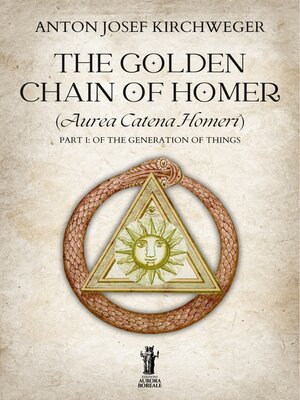The Golden Chain of Homer (Aurea Catena Homeri), Part 1
ebook ∣ Of the Generation of Things
By Anton Josef Kirchweger

Sign up to save your library
With an OverDrive account, you can save your favorite libraries for at-a-glance information about availability. Find out more about OverDrive accounts.
Find this title in Libby, the library reading app by OverDrive.



Search for a digital library with this title
Title found at these libraries:
| Library Name | Distance |
|---|---|
| Loading... |
As the great esotericist and freemason Manly Palmer Hall pointed out, the Golden Chain of Homer comes originally from the Iliad which refers to the Golden Chain that connects the Supreme Deity to all of manifestation. In 1731, it was written about in Anton Josef Kirchweger's book by the same name. The book relates a human being's spiritual development to the steps in the alchemical process. Besides alchemy, Hall ties in Hermeticism, Platonism, and Neoplatonism along with the Divine Purpose of Life as symbolized by the Ouroboros.
We have very little information on the life of Anton Josef Kirchweger. We know that he was German and that, according to Willy Schrödter, he died on February 8, 1746. He was the author of the influential German hermetical book Aurea Catena Homeri Oder, Eine Beschreibung von dem Ursprung der Natur und Natürlichen Dingen (The Golden Chain of Homer, or A Description of Nature and Natural Things), better known as Aurea Catena Homeri.
The book was read by Pietists and later influenced the young Goethe. It was first published in Leipzig in 1723, in the German language, followed by other editions: 1723, 1728, 1738 and 1757 (Latin edition). Another Latin version was issued at Frankfurt in 1762. Sometime in the late eighteenth century Sigismund Bacstrom translated parts of the work into English. In 1891, part of the translation was published in the Theosophical Society journal Lucifer.
Today we offer our readers the first part of the Kirchweger's book, entitled Of the Generation of things, in the English translation edited by Sigismund Bacstrom.
We have very little information on the life of Anton Josef Kirchweger. We know that he was German and that, according to Willy Schrödter, he died on February 8, 1746. He was the author of the influential German hermetical book Aurea Catena Homeri Oder, Eine Beschreibung von dem Ursprung der Natur und Natürlichen Dingen (The Golden Chain of Homer, or A Description of Nature and Natural Things), better known as Aurea Catena Homeri.
The book was read by Pietists and later influenced the young Goethe. It was first published in Leipzig in 1723, in the German language, followed by other editions: 1723, 1728, 1738 and 1757 (Latin edition). Another Latin version was issued at Frankfurt in 1762. Sometime in the late eighteenth century Sigismund Bacstrom translated parts of the work into English. In 1891, part of the translation was published in the Theosophical Society journal Lucifer.
Today we offer our readers the first part of the Kirchweger's book, entitled Of the Generation of things, in the English translation edited by Sigismund Bacstrom.







